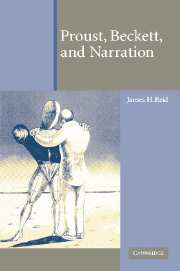Book contents
- Frontmatter
- Contents
- List of abbreviations
- Introduction
- 1 Remembering forgetting: Le Drame du coucher
- 2 Impressions, the instant of artistic consciousness, and social history
- 3 Lying, irony, and power: Proust's deceptive allegories
- 4 Proust's forgetful ironies
- 5 Molloy's Way: The parody of allegory
- 6 Moran's Way: The forgetful spiral of irony
- 7 Malone Dies and the impossibility of not saying I
- 8 The Unnamable: The death of the ironical self and the return of history
- Notes
- Bibliography
- Index
Introduction
Published online by Cambridge University Press: 22 September 2009
- Frontmatter
- Contents
- List of abbreviations
- Introduction
- 1 Remembering forgetting: Le Drame du coucher
- 2 Impressions, the instant of artistic consciousness, and social history
- 3 Lying, irony, and power: Proust's deceptive allegories
- 4 Proust's forgetful ironies
- 5 Molloy's Way: The parody of allegory
- 6 Moran's Way: The forgetful spiral of irony
- 7 Malone Dies and the impossibility of not saying I
- 8 The Unnamable: The death of the ironical self and the return of history
- Notes
- Bibliography
- Index
Summary
Marcel Proust's A la recherche du temps perdu had a substantial impact on Beckett's dramatization of his first-person narrators' search for self in his trilogy of novels, Molloy, Malone Dies, and The Unnamable. Numerous studies have cited, as evidence of this influence, not only Beckett's discussion in his early essay Proust of the search for self in Proust's Recherche, but also his own narrators' Proustian concern with whether or not their words express a self. However, despite the critical importance of the Recherche and the trilogy for the twentieth-century novel, and despite the significant impact of the Proustian search for self on Beckett's trilogy, there has been no rigorous comparison of the two novelists' use of first-person narration to construct the fiction of consciousness, or of the critical theme of self-consciousness which structures the search for, and demystification of, self in both their novels.
The present study seeks to fill this gap in the critical literature by exploring the different ways in which first-person narration structures the search for self-consciousness in both the Recherche and the trilogy. I will argue that, in these texts, first-person narration takes the form of an interplay between the tropes of allegory and irony as they are defined by Paul de Man. The difference between irony and allegory is succinctly expressed by Beckett. In The Unnamable, he speaks of irony as “affirmations and negations invalidated as uttered, or sooner …” He speaks of allegory as “affirmations and negations invalidated … later” (TN, 291).
- Type
- Chapter
- Information
- Proust, Beckett, and Narration , pp. 1 - 12Publisher: Cambridge University PressPrint publication year: 2003



